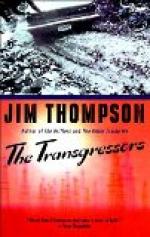Gorman Purdy had been seated in his library when his last summons came. He was attired in full evening dress. On his shirt bosom, over the heart, is a spot of blood. It shows where the bullet had found its mark.
A hurried consultation is held. It is decided that the body be carried to the Potter’s field and thrown into the open grave that is kept for paupers.
Three men pick up the body and start to leave the house.
All this while the impatience of the throng outside has found vent in ribald jests.
“One dead millionaire is better than an army of workmen,” jeers one man.
“He has come to life and has offered to arbitrate,” sneers another.
“Bring him out!” is the incessant cry of the thousands.
And now the cortege appears. O’Neil and three committeemen carry the body of Metz. They pass between an avenue of men, who give way deferentially.
On reaching the Esplanade the pall-bearers pause. They face toward the bridge and wait for the procession to form. Then the trio who carry—or to be precise, drag the body of Purdy—emerge.
A great shout is given as the masses catch a glimpse of the body of the man who in his lifetime was their unmerciful master.
Darkness has supplanted the twilight. Now the contrast between light and shade is sharp. At intervals of fifty feet along the Esplanade, wrought iron gothic flambeaux support powerful electric lights. Objects beyond the immediate radius of the lights are indistinguishable. The windows of all the palaces are all closed and barricaded. From across the river the accustomed flare of the furnaces is missing. The fires are extinguished.
The uncouth countenances of the men and women can be studied in intermittent flashes as they pass under the strong glare of the lights. The utter absence of men and women of gentility makes the procession seem like the invasion of the Huns into the Empire. Among the thousands there are descendants of those very men who made the legions of Rome flee in terror. The torch of progress is again in the hands of the uncultured, and as history proves the race is to undergo another evolution.
That it is to be effected by internecine revolution none doubts. The march of carnage is on. Whither will it tend?
A leader of genius is wanted. The plastic emotions of the multitude will yield to his command.
Already the peaceable character of the visitation of the humble to the habitation of the haughty, has changed to one of violence.
O’Neil has been able to create the storm, but he lacks the capacity to direct it. The man of might has stepped forward and has been hailed as chief.
Just as the body of Purdy is to be brought down the terrace the sound of distant cheering is heard. It comes from the direction of the bridge. The men who have hold of the millionaire’s body, drop it.




